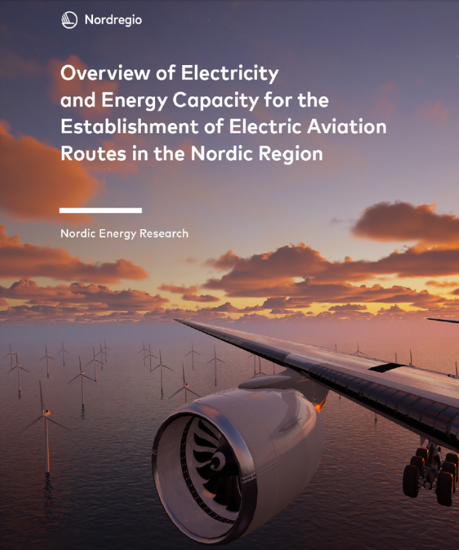
Electric Aviation and the effects on the Nordic region
The project Electric Aviation and the effects on the Nordic region attempts to map what is needed to initiate electric aircrafts in the Nordics
In co-operation with the Nordic Council of Ministers and Nordregio, Nordic Energy Research has published the first report within the project Electric Aviation and the effects on the Nordic region. The report Overview of Electricity and Energy Capacity for the Establishment of Electric Aviation Routes in the Nordic Region explores suitable routes in the Nordic region for establishing electric aviation according to two factors: energy demands of airports and regional power adequacy.
“I hope this publication will enlighten the possible pathways for the Nordic Region to remain a frontrunner in the decarbonization of aviation transportation. By showcasing case studies for electric aviation routes in the Nordic countries where airports can rather easily establish infrastructure and system integration with the energy system needed in the transition towards electric aviation.”
Klaus Skytte, CEO of Nordic Energy Research
Read and download the report here

Electric aviation has become a hot topic as the world is working towards achieving carbon neutrality. In the Nordic region, the governments have set targets to reduce greenhouse gas emissions, and electric aviation has been identified as a promising technology to reduce emissions from air transport. However, introducing the first generation of electric aircraft in the Nordic countries requires overcoming political, geographical, energy, and technical barriers. The project Electric Aviation and the effects on the Nordic region attempts to map what is needed to initiate electric aircrafts in the Nordics.
Objectives of the project
The primary objective of the project “Electric Aviation and the effects on the Nordic region” is to lay a valid foundation for selecting five Nordic aviation routes as case studies for investigating regional and local effects related to introducing electric aircraft. The work with case studies will initiate in spring 2023. Additionally, the project aims to increase accessibility and mobility in the Nordic region by discovering potentials that can improve the connection between rural and urban areas.

Cross-sectoral collaboration
The cross-sectoral collaboration between Nordregio and Nordic Energy Research is vital for conducting this project because of the complexity of dealing with a large sector such as aviation that involves different stakeholders and demands different perspectives and expertise to enable the green transition and introduce innovative technologies. The project successfully demonstrates how to manage cross-sectoral collaboration and use the advantages of gathering different expertise to answer important questions that require comprehensive knowledge to lead the green transition. It is perceived as a benefit to doing it more.
Status of electric aviation in the Nordic countries
Nordregio has compiled an outlook on the status of electric aviation in the Nordic countries, including national plans and political targets related to the sector. The accessibility study conducted by Nordregio identifies Nordic aviation routes that enable time benefits by electric aviation in GIS. The aviation routes are designated based on specific selection criteria that include time benefits compared with other on-land modes of transport and overcoming difficult geographical conditions such as undertaking cross-water distances or crossing mountains. Nordic Energy Research provides a report containing a technical investigation on standard specifications of the first electric aircraft and charging infrastructure and a regional assessment of the energy adequacy of power grids and capacities in the Nordic countries. The purpose is to add energy perspectives and assessments to base the selection of five case studies.
The cross-sectoral collaboration between institutions in the Nordic region is essential for investigating the effects of electric aviation in the Nordic region. The project “Electric Aviation and the effects on the Nordic region” aims to lay a valid foundation for selecting five Nordic aviation routes as case studies for investigating regional and local effects related to introducing electric aircraft.
Background of the project
The project “Electric Aviation and the effects on the Nordic region” received funding in 2022 from the Nordic Council of Ministers as part of its cross-sectoral collaboration effort on the green transition of the transport sector. The project aims to investigate how the introduction of electric aviation would impact regions and local communities in the Nordic region. The project is owned by Nordregio and collaborates with the University of Akureyri and Nordic Energy Research. The Nordic countries affiliated with the project are Iceland, Finland, Sweden, Norway, and Denmark.

